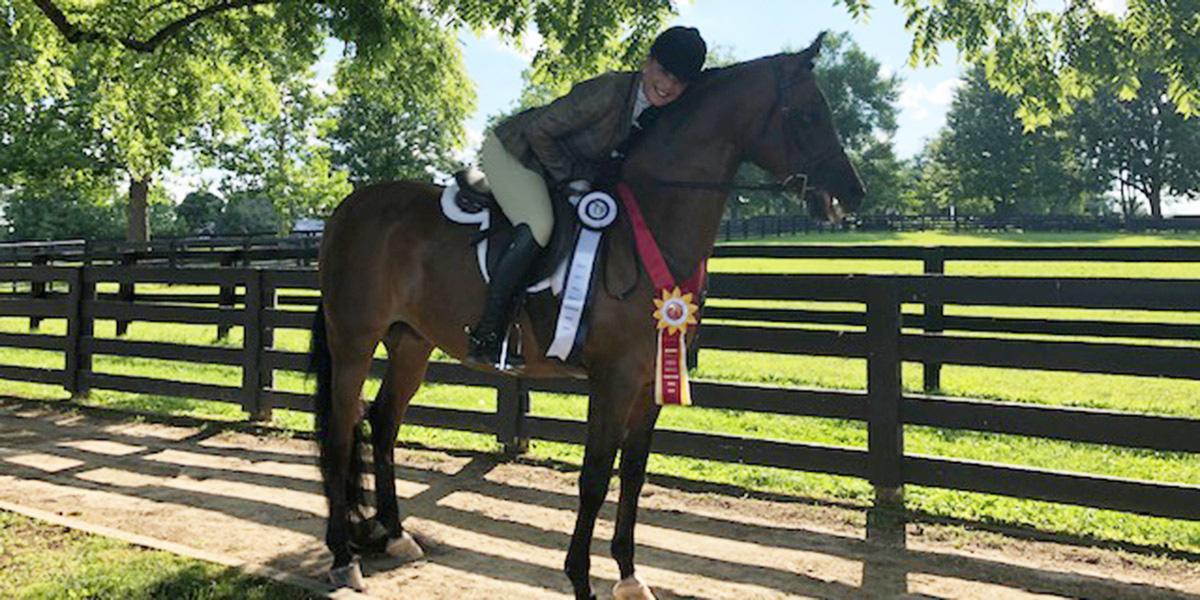Colic conundrum
Brush with death can’t slow down Arabian show horse

Brush with death can’t slow down Arabian show horse
The weekend couldn’t have gone better for Kathy Schwartz and her then 9-year-old Arabian named Leinie. The pair had spent those last few days during February 2018 competing in the Scottsdale Arabian Horse Show’s hunter/pleasure division.
“He just had a magnificent show, he really did great,” Schwartz said. “And I even got my first ribbon on him. I'm 61, so I’m an older rider, and for me to get top eight was so cool.”
Leinie holds a special place in Schwartz’s heart as the first horse she’s ever owned. He came into her life as a stubborn 4 year old intent on doing things his way. With several years of training under his belt and Schwartz’s loving care, Leinie came a long way to shine in show arenas. Still, some of that stubbornness never quite faded away.
He’s just a fun-loving, gentle horse. He’s very spirited. He likes to have a lot of fun.
Kathy Schwartz
“He knows what buttons to push and if you give him an inch, he takes a mile—he knows mom’s weaknesses,” Schwartz says with a laugh. “But he’s just a fun-loving, gentle horse. He’s very spirited. He likes to have a lot of fun but, maybe at other people’s expense.”
After the Scottsdale show, it was time for a 36-hour drive back to River Falls, Wis., where Leinie and his sister, Georgie, are boarded at Westridge Farms. A few hours after dropping Leinie, Schwartz received a phone call from his trainer Jenna Ball that Leinie was experiencing colic.
Colic is a broad term that refers to abdominal pain and can be indicative of several different underlying conditions. The symptom concerned Schwartz, who headed to the farm and spent most of the night with Leinie.
With no improvement to his condition the following day, Leinie was loaded up and taken to his usual veterinarian in Stillwater, Minn. After an evaluation Leinie and Schwartz were referred to the University of Minnesota Equine Internal Medicine Service, which is based at the Piper Equine Hospital in the Leatherdale Equine Center.
More tests were performed and sent off to as far away as California for evaluation. After reviewing the results, Leinie’s care team diagnosed him with enterocolitis caused by a bacterial infection.
Enterocolitis is inflammation of the intestine that results in fever, diarrhea, colic, and loss of blood proteins through the inflamed intestinal wall. Schwartz recalls that Leinie’s colon was abnormally fluid-filled during his illness, that his blood protein levels had fallen dangerously low, and that he was at risk of developing laminitis, a painful hoof condition that occurs as a complication of severe inflammatory disease.
When faced with this serious diagnosis, it’s not uncommon for owners to choose to euthanize their horses. That just wasn’t an option for Schwartz, who chose to move ahead with the treatment.
“I kind of knew that I could lose him, but we didn't know what else to do,” she says.
Treatment began and days of tense waiting followed. Leinie’s care team provided around-the-clock intensive care to improve his comfort, fight inflammation, normalize his blood chemistry and protein levels, encourage intestinal healing, and ward off laminitis and other complications.
Slowly, it became clear Leinie had the will to fight and survive. Bit by bit, his condition improved. His care team regularly ran blood tests and administered extra plasma as needed. As a precaution, Leinie was kept isolated from other horses and fed small meals that wouldn’t irritate his healing gut.
Once he and Schwartz received the all clear to return home, Leinie steadily began reacclimating to life outside the hospital. The fact that he was alive and had survived the entire ordeal was enough for Schwartz, but her plucky horse wasn’t done surprising her.
In time, Leinie improved considerably and soon was back competing in shows. He won reserve champion in his class at the 2019 U.S. National Arabian Horse Championships. He followed up that title with another reserve champion award at the Silverama Horse Show & Regional Championships in 2020.
This past February, Schwartz and Lenie returned to Scottsdale, where the now 12-year-old survivor showed the world what he had fought so hard to achieve. Leinie was crowned champion of his class, a feat Schwartz knows wouldn’t be possible without the care her horse received from the College of Veterinary Medicine and Westridge Farms. Looking at Leinie now, no one would ever guess the ordeal that horse and owner have been through, and for that Schwartz, too, is grateful.
“He’s just as beautiful and stubborn and sweet as he always has been,” she says.